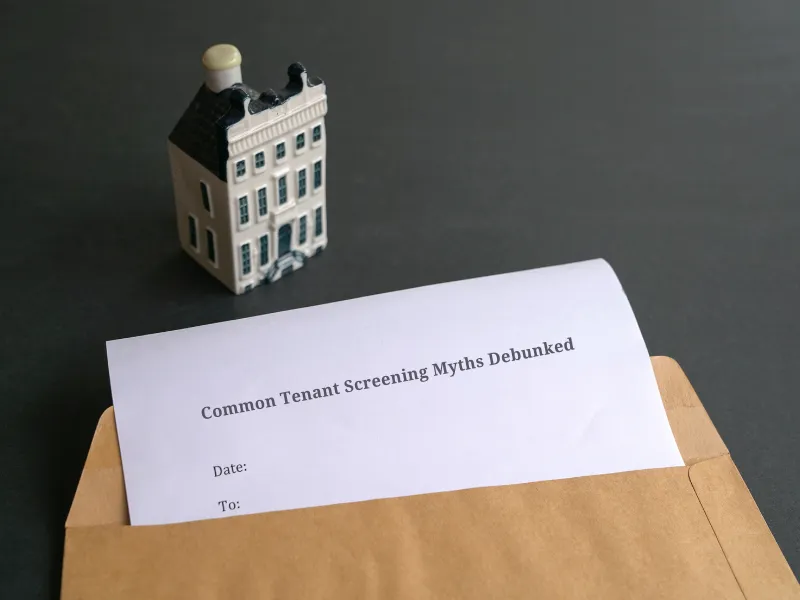.webp)
As a landlord, renting out properties can be tough. Finding the right tenant is a big worry.
A bad tenant can cause expensive damage, unpaid rent, and eviction costs. This can hurt your profits. So, a good screening process is key.

But, there are myths about screening that can cost you money. In this article, we'll clear up these myths. We'll also give you a detailed guide to making your rental property business successful.
"The evolution of tenant screening isn't just about risk mitigation—it's about relationship building from day one. When property owners invest in comprehensive screening processes, they're actually creating the foundation for successful tenancies that benefit everyone. The most expensive screening isn't the one that costs $100; it's the one that misses critical insights about compatibility between tenant and property. At its core, proper screening is less about keeping people out and more about ensuring the right match that leads to stable, respectful, and mutually beneficial housing relationships."
Taylor Wilson, CEO of Rent with Clara

Poor tenant screening costs more than just money. It can lead to many problems that hurt your finances for a long time.
Choosing the wrong tenants can cost you a lot. You might face thousands in damages, unpaid rent, and eviction fees.
The financial damage from bad tenants is big:
These costs can quickly add up. What seems like a small mistake can become a big financial problem. It's key to screen tenants well to avoid these risks.
Poor tenant screening has long-term effects too.
It's not just about money:
Understanding the full cost of bad tenant screening shows why it's so important. A detailed rental history check and a good tenant screening process are worth the investment. They save you money and stress in the long run.

Many landlords believe in myths about tenant screening, which can cost them a lot. These myths can lead to mistakes that cost money. We will clear up these myths and explain why they are believed by many landlords.
Several reasons make these myths hard to shake. One big reason is a lack of understanding about the screening process. Many landlords trust their gut feelings over thorough screening, which can lead to bad tenants.
Another reason is the belief that screening is too expensive or time-consuming. Some think it's too costly or takes too long. But, the cost of not screening properly is much higher than the cost of doing it right.
"The biggest risk in tenant screening is not the cost of the screening itself, but the cost of not doing it properly."
Taylor
Believing in these myths can hurt a landlord's wallet. For example, thinking a good credit score is enough can lead to missing other important details. This can result in renting to tenants who cause problems, leading to damage, unpaid rent, or legal trouble.
By understanding and debunking these myths, landlords can make their tenant screening better. This can help avoid costly mistakes and keep their profits safe.
Many believe a high credit score means a tenant is reliable. But, credit scores only tell part of the story. They don't show the whole picture of a tenant's trustworthiness.
Just looking at credit scores can miss important details. For example, a tenant's rental history and employment stability show if they can pay rent on time.
Looking at these factors helps landlords make better choices. It helps them avoid renting to tenants who might cause problems.
Using a balanced approach to screening is key. This includes credit scores, rental history, employment checks, and personal references. It gives a full view of a tenant's reliability.
Landlords should also use specialized tenant screening services. These services offer detailed reports on tenants, like their credit, criminal history, and past evictions. This way, landlords can make smarter choices and lower risks.
Many landlords think background checks are too pricey and take too long. But, the truth is, they are a small price to pay compared to the costs of eviction. A thorough background check can save you from many problems.
Not doing background checks can cost you a lot. Evicting a tenant can cost between $1,000 to $5,000 or more. On the other hand, a good background check costs only $20 to $50 per person.
The risks of not doing background checks are much higher. Without checks, you might rent to someone with a criminal past. This can damage your property, put others at risk, and lead to legal trouble.
Solutions for Landlords
There are ways to screen applicants without spending a lot. Here are some options:
As one property management expert says, "A thorough background check is an investment in your rental property's future. It's a small price to pay for the peace of mind that comes with knowing you're renting to a reliable tenant."
"The cost of a background check is minimal compared to the potential costs of eviction and property damage. It's a crucial step in protecting your investment."
By understanding the true cost of skipping criminal background checks and using cost-effective solutions, landlords can protect their investments. This ensures a safer and more reliable rental experience.
Thinking gut feelings are always right when picking tenants is a big mistake. It can cost you a lot of money. As a landlord, using your gut instead of facts can lead to big errors in choosing tenants.
Deciding based on feelings alone can put landlords at risk. When you let feelings guide you, you might break fair housing laws. This can hurt your reputation and lead to expensive lawsuits.
"The biggest risk in relying on gut feelings is that it can lead to discriminatory practices, which are against fair housing laws."
To stay safe, landlords should use a clear, fact-based way to screen tenants. This means:
Not following fair housing rules can lead to big legal problems. Landlords need to know the dangers of making choices based on feelings.
Knowing these risks and using a fair, fact-based way to screen tenants can help landlords avoid legal trouble. It also makes renting fairer for everyone.
Many landlords don't realize how crucial it is to check a potential tenant's rental history. This step helps you spot potential issues and make better choices about who to rent to.
When looking at a tenant's rental history, watch out for certain signs.
These include:
These signs can show that the tenant might not be reliable or responsible.
To check rental history well, property managers can try a few methods:
Using these methods, property managers can get a full picture of a tenant's rental history. This helps them make better choices.
As Michael C., a real estate expert, once said,
"A thorough tenant screening process is crucial for minimizing risk and ensuring a smooth landlord-tenant relationship."
This highlights the need to check rental history as part of a detailed tenant screening process.
Many think hiring a property manager means you don't need to screen tenants. But this is a big mistake. A property manager is helpful, but you still must make sure your tenants are good.
Every real estate investor knows that a prospective tenant's income doesn't tell the whole story. You need to dig deeper into their financial obligations to understand if they can truly afford your property.
Start by requesting recent pay stubs, tax returns, or bank statements to verify their stated income. For self-employed applicants, ask for profit and loss statements or an individual taxpayer identification number for tax verification.
The general rule is that rent should not exceed 30% of their gross monthly income, but don't stop there.
Look beyond the numbers on their rental application and examine their employment history for stability. A responsible tenant typically shows consistent employment for at least two years, though exceptions exist for recent graduates or career changers with solid references.
Check if they pay other bills on time by reviewing their payment history for utilities, car loans, or other recurring expenses. This gives you a clearer picture of their financial habits than credit scores alone.
Red flags often appear during the application process if you know what to look for. Be cautious if a prospective tenant has missed rent payments within the last 12 months, even if they provide explanations.
Multiple job changes in a short period, especially without career advancement, can signal instability. Watch for applicants who seem eager to move in immediately without proper notice to their current landlord - this could indicate they're behind on rent and facing eviction.
Pay attention to how applicants handle the application fee and security deposit requirements. Someone who struggles to pay these upfront costs or asks for extended payment plans may have trouble with monthly rent.
Similarly, be wary if they can't provide recent pay stubs or seem evasive about their income sources. A reliable renter will have their financial documents organized and readily available.
Even with a property manager, you play a key role in tenant screening. Work with your manager to create a detailed screening plan.
This should include:
By being involved, you help manage your property well. You also make sure you get the best tenants possible.
To get the most from your property manager, set clear expectations.
This means:
This way, your manager will work for your benefit. They'll pick tenants who fit your property well. Remember, a good manager is a great partner, but they can't make all the decisions.
In short, while a property manager is helpful, they can't replace thorough tenant screening. Stay involved and set clear standards to protect your investment. This way, you'll have a successful rental experience.
Establishing clear income requirements protects your investment while ensuring compliance with the federal fair housing act. Create written screening practices that apply equally to all applicants to avoid violating fair housing laws.
Require verifiable income of at least three times the monthly rent, and don't make exceptions based on personal circumstances or feelings. Document your criteria clearly so you can demonstrate consistent application to the Housing and Urban Development if needed.
Remember that your goal is to find a tenant who will pay their rent on time every month. Consider requiring additional documentation for applicants with limited credit history or recent negative marks.
Some landlords request co-signers for applicants who meet income requirements but have credit concerns. Whatever standards you set, apply them consistently to every applicant.
When a tenant fails to meet your established criteria, stick to your guidelines rather than making exceptions that could create legal exposure later.
By avoiding common tenant screening myths, you can create a profitable process. This helps you pick reliable tenants who pay rent on time. A good screening process checks a tenant's credit, rental history, and social security number.
To make a good screening process, be thorough and fair. Use various tools and methods to judge potential tenants. Don't just go by your gut or incomplete info.
Following the advice in this article helps you make smart choices. It lowers the chance of making expensive errors. A well-thought-out screening process finds you the best tenants and keeps your investment safe.